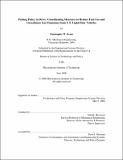Putting policy in drive : coordinating measures to reduce fuel use and greenhouse gas emissions from U.S. light-duty vehicles
Author(s)
Evans, Christopher W. (Christopher William)
DownloadFull printable version (761.5Kb)
Alternative title
Coordinating measures to reduce fuel use and greenhouse gas emissions from U.S. light-duty vehicles
Other Contributors
Massachusetts Institute of Technology. Technology and Policy Program.
Massachusetts Institute of Technology. Engineering Systems Division.
Advisor
John B. Heywood.
Terms of use
Metadata
Show full item recordAbstract
The challenges of energy security and climate change have prompted efforts to reduce fuel use and greenhouse gas emissions in light-duty vehicles within the United States. Failures in the market for lower rates of fuel consumption necessitate government involvement. But efforts have been weakened by a controversial regulatory system, and the need for perverse incentives that have contributed to a slight increase in the average rate of light-duty vehicle fuel consumption alongside a 70% increase in vehicle travel relative to the mid-80's. This research evaluates the role of fiscal policies in overcoming barriers to reducing fuel use and greenhouse gas emissions in U.S. light-duty vehicles. It conducts a survey of fiscal policies and their implementation internationally. A model of the U.S. light-duty vehicle fleet is used to assess a fuel tax in comparison to -- and in coordination with -- the recently legislated Corporate Average Fuel Economy (CAFE) standard legislated by the Energy Independence and Security Act. Engineering cost estimates of technology improvements and vehicle powertrains are used to evaluate the costs and benefits of a technology penetration scenario that approximates the new CAFE standard. Alongside CAFE, fiscal options can achieve reductions more effectively by: (i) acting on a broader range of stakeholders; (ii) influencing behavioral responses as well as technological changes; and (iii) by sending price signals across multiple stages of vehicle purchase, operation, and retirement. Using illustrative scenarios, the report demonstrates that fiscal policies align consumer demand for lower rates of fuel consumption with the requirements that CAFE imposes on manufacturers. (cont.) The costs of reducing fuel consumption are estimated to be 8 to 20% of the baseline cost if fuel consumption remained unchanged from today, corresponding to retail price increases of $1,500 to $4,500 for the average vehicle between 2020 and 2035. These significant costs are largely offset by fuel savings benefits within 2 to 4 years relative to no change.
Description
Thesis (S.M. in Technology and Policy)--Massachusetts Institute of Technology, Engineering Systems Division, Technology and Policy Program, 2008. This electronic version was submitted by the student author. The certified thesis is available in the Institute Archives and Special Collections. Includes bibliographical references (p. 101-110).
Date issued
2008Department
Massachusetts Institute of Technology. Engineering Systems Division; Technology and Policy ProgramPublisher
Massachusetts Institute of Technology
Keywords
Technology and Policy Program., Engineering Systems Division.